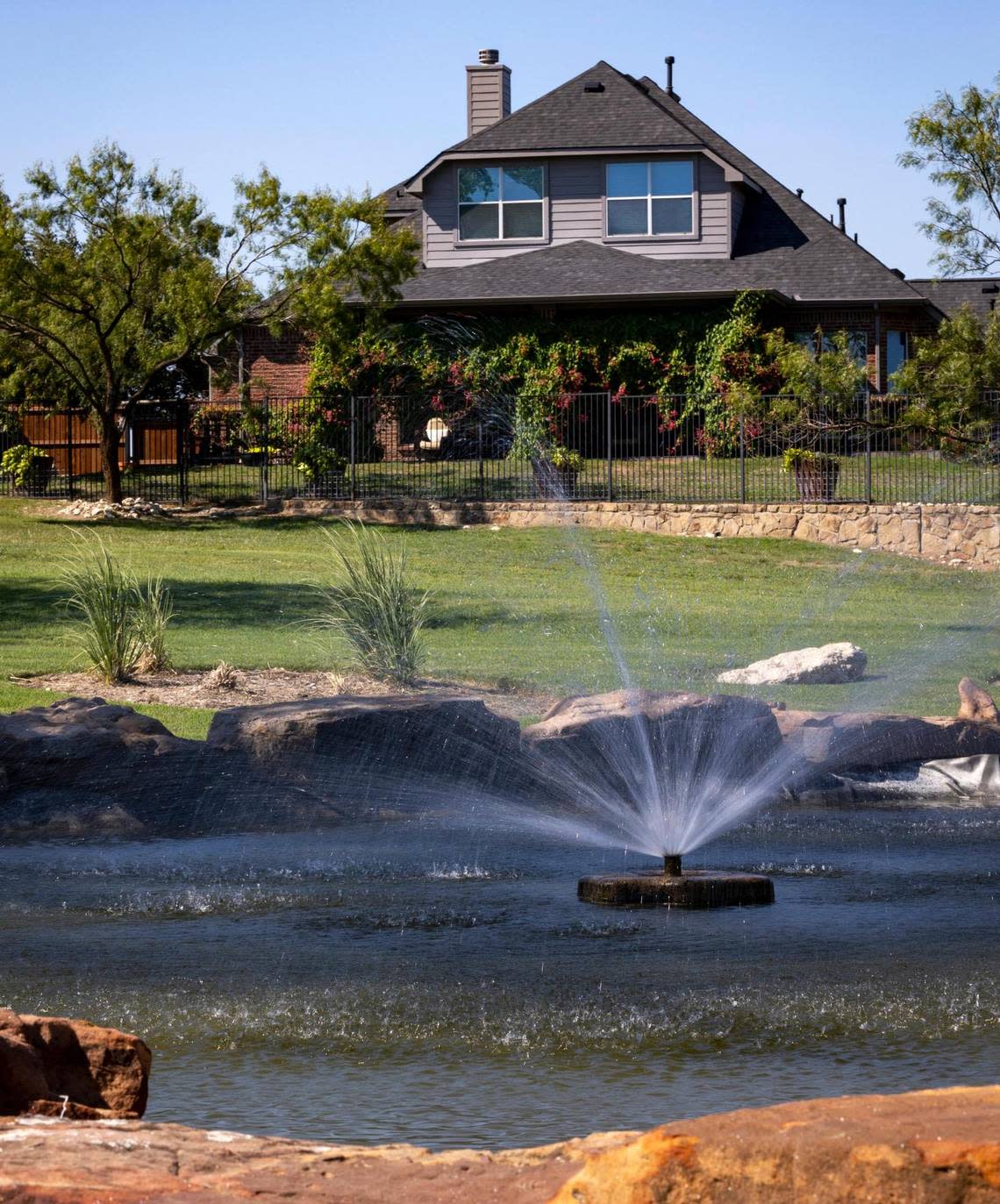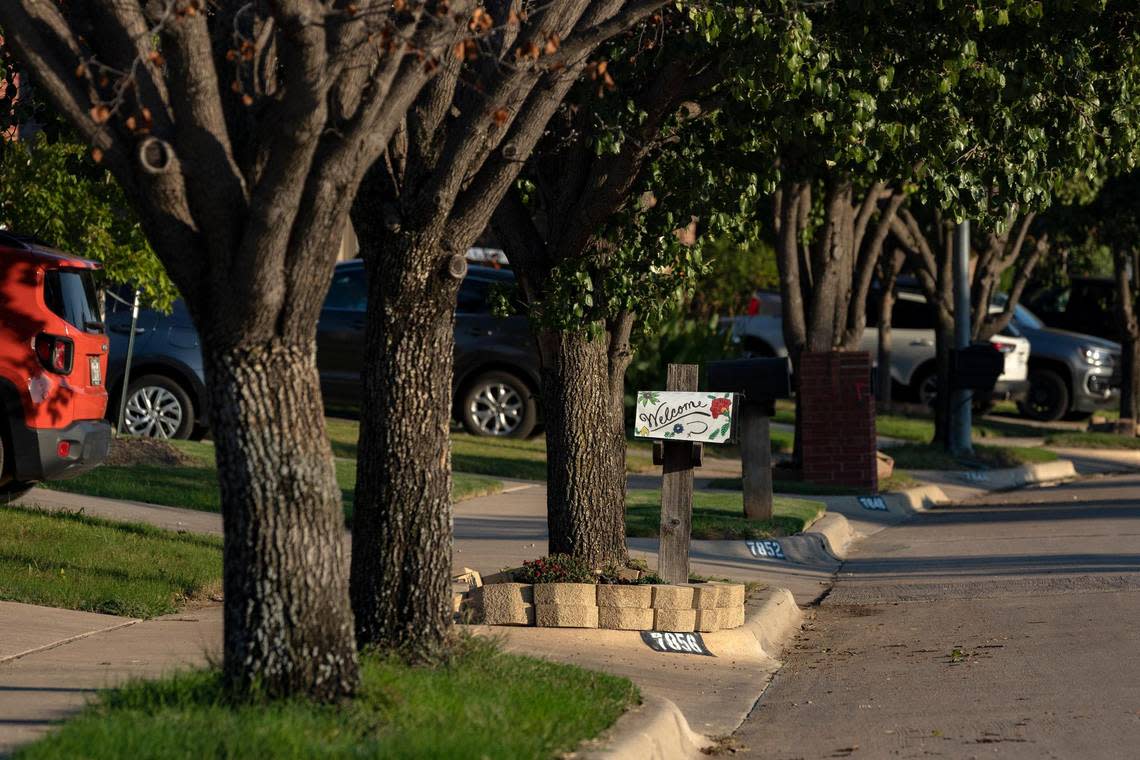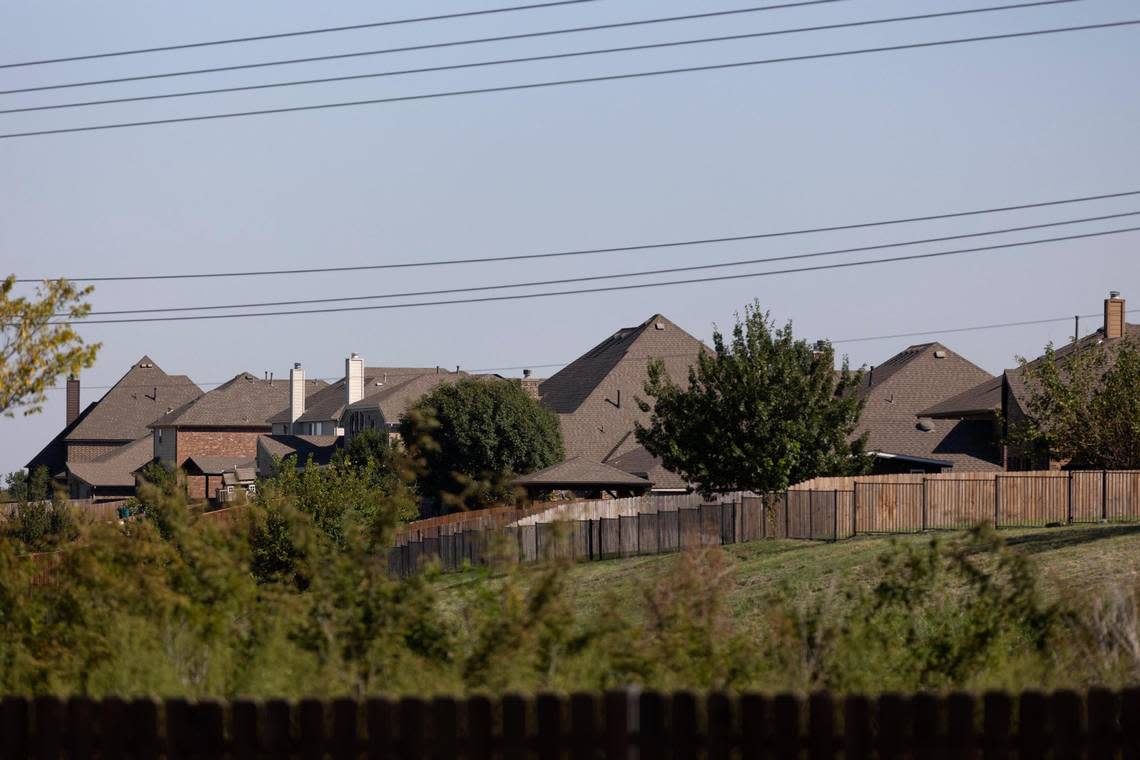Is your HOA heaven or hell? In Texas, buying a house almost always means joining one.
Ryan Smith and his wife, Kim, love where they live.
“Just being next to the lakes,” Smith said by way of an explanation.
They moved into a 2,400-square-foot home in Marine Creek Ranch in 2007 — a housing development of 1,700 homes northwest of downtown Fort Worth. It’s a beautiful collection of houses on a shore of Marine Creek Lake with a Tarrant Regional Water District walking trail meandering along the water’s edge and a boat dock courtesy of the homeowners association.
It is also just down the road from Eagle Mountain Lake.
For a clubhouse, the neighborhood association moved a century-old log cabin into the property. The neighborhood pool sits behind the old structure with a striking vista of the lake.
What’s not to like?

Smith ought to know. He makes a living as a property manager and he is president of the Northwest Fort Worth Neighborhood Alliance, a cooperative of some 30 HOAs.
With 5,965,000 Texans belonging to homeowners associations, “A lot of people, you’ve probably heard, have negative thoughts on HOAs,” Smith said.
But he is a true believer.
“We think we’re a good HOA. We try to,” he said. “We do think our HOA is one of the better ones.”
More than 21,000 homeowners associations exist in Texas, with residents paying $9.5 billion a year to maintain their communities, according to the Community Associations Institute. Those 2,093,000 homes are generally valued at least 4% more than other homes.
“Well, obviously HOAs are there to keep up the values of the home and keep the neighborhood clean,” Smith said. “So yeah, we try to make sure our common areas look good because we know that it’s expected.”
Making life in the neighborhood as fun as possible is also a priority at Marine Creek Ranch, he said. They’ve brought food trucks to the property so residents could eat together. They sponsor a fireworks show every Fourth of July.
“We believe we need to show the HOA that we’re giving them something back and promoting the community,” Smith said. “So it’s fun.”

The number of HOAs in the state is only expected to grow from here. By 2040, the homeowners association housing model is expected to become the most common form of housing.
“It’s nearly impossible for practical reasons, under today’s laws, for any real estate development to be created that doesn’t have a homeowners association, which is why ultimately the number of associations grows exponentially every single year,” said Gregory Cagle, author of Texas Homeowners Association Law.
If you’re buying or selling a home in Texas, you have rights and responsibilities through your HOA, which wields far-reaching power to apply certain regulations.
Knowing the “Covenants, Conditions and Restrictions” is key, Smith said. The payoff is the consistent upkeep of the property.
People pick housing developments with neighborhood associations because “they don’t want to live next to a house that’s not taken care of,” he said.
Why do homeowners associations exist?
A homeowners association or HOA is an organization composed of property owners that makes and enforces rules for the properties and residents within its jurisdiction. HOAs, set up by real estate developers, exist to enhance neighborhoods and increase property values. To that end, HOAs maintain shared public areas and enforce contractual obligations known as “Covenants, Conditions and Restrictions” for association members.
Property owners are required to be members of the HOA, pay certain dues, assessments or other fees, and follow guidelines regarding the maintenance and appearance of their property. Typically, an HOA is run by a governing board of three to five individuals, initially appointed by the developer then elected by the HOA members. While commonly referred to as HOAs, Texas law uses the term “property owners’ associations.”
“HOA’s in Texas allow homeowners to live in a neighborhood that has minimum standards that the homeowner wants and agrees to before purchasing his/her property. For example, there are typically yard and house maintenance standards,” said Susan Kenney, president of the Park Glen Neighborhood Association in Fort Worth. “Advantages of an HOA are the homeowner can have some assurance that the deed restrictions will be upheld and that the property values and quality of life in the neighborhood will be maintained or improved.”

The Park Glen association was formed in 1993 by Ross Perot Jr.’s company, Hillwood/Park Glen Ltd. Park Glen along with a few other areas adjacent to it are in a Public Improvement District (PID6), which is a taxing district. The homeowners in the PID6 district pay an additional property tax that maintains Arcadia Park and other parks and green areas, as well as the landscaping on main roads in PID6.
Most homeowners associations in Texas are formed as nonprofit corporations. This means that they are business entities formally created under Texas law and registered with the Secretary of State. If the association is on file with the secretary of state’s office, they can provide you with the information in their records.
The number of homeowners associations throughout the U.S. has rapidly grown in the past 50 years, Cagle said. In 1965, there were only about 500. By 2015, there were nearly 350,000. That happened in part because of the passage of the 1977 Clean Water Act, which provided financial incentives for real estate developers to establish HOAs to oversee required stormwater retention and remediation. The second factor that led to the proliferation of HOAs was the creation of the condominium form of real estate ownership.
“They’re an essential and necessary part of real estate development,” Cagle said. “And they allow these types of developments to be created, and to provide for long-term perpetual maintenance of portions of the property that serve and benefit the homeowners.”
Do I have an HOA?
There are three ways that you can find out if your property is subject to an HOA:
When you’re buying a home, you can request that the association give you a copy of the bylaws, rules, and restrictive covenants of the association and a resale certificate, which summarizes the finances of the association and any outstanding money owed by the property. You may be charged a fee for the resale certificate.
Check your deed, which may list any restrictions or the name of the association.
Search the real property records in the county where your home is located. Associations are required to file certain documents in the real property records of the county clerk’s office in the county where they are located. Some counties have online databases for their property records.
Who regulates homeowners associations?
While there is not a state agency that oversees homeowners associations in Texas, they must abide by certain state laws, as outlined by the Texas Property Code. The code has several provisions regulating the creation, authority, operation and management of homeowners associations in the state.
Homeowners should be familiar with Chapter 209, the Texas Residential Property Owners Protection Act, which lists out all the rules and regulations that subdivision HOAs must follow. It covers topics such as board governance, elections and voting, record-keeping and an owner’s right to access records, protections regarding third-party collections, required notices, foreclosures for assessment liens, and leasing regulations. Chapter 82 of the property code, also known as the Uniform Condominium Act, regulates HOAs for condos. And Chapter 202 of the code, Construction and Enforcement of Restrictive Covenants, covers land use restrictions for both condo and subdivision residents. Along with the property code, most HOAs must abide by Chapter 22 of the Texas Business Organizations Code, which outlines how a nonprofit must be formed and operated.

J. Patrick Sutton, an Austin-based real estate attorney who specializes in HOA law, says HOAs are given far more authority than they used to be, making it essential for homeowners to know the limits of their HOA. What the board can do is spelled out in the restrictive covenants for your subdivision. If it isn’t, the board doesn’t have that power. He recommends consulting a lawyer in the process of purchasing a home in an HOA community, as they can read those restrictions and advise you before you buy.
“In some of the cases I’ve handled, I’ve had board members say ‘We’re the board and we can do whatever we want.’” Sutton said. “That’s false, because HOAs are authorized by restrictive covenants. Those restrictive covenants that are on file in the county are the constitution for every subdivision. Those are what define what a board can do. Many of the fights I’ve had over the years are about when restrictive covenants are silent. Does that mean a board just gets to do whatever it wants? And the answer’s no. Silence means that there is no restriction.”
If you have a set of rights that are reflected in the restrictive covenants, can those then be taken away after you buy a home? That’s a case Sutton is currently handling in the Texas Supreme Court. Unlike most states, under current Texas law, any of the homeowner rights you have when you buy can get taken away from you immediately after your purchase, Sutton says.
What if I have an issue with my HOA?
Some of the most common issues reported by homeowners, per the Jakob Law Firm, are as follows:
Steadily rising expenses that can significantly increase the overall cost of the home
Inconsistent application of the rules outlined in the contractual agreement
Ineffective enforcement of rules for serious or dangerous nuisances
Failure to alert members of the HOA regarding special assessments and increases in fees
Overly intrusive interventions into normal activities
Failure of the HOA to provide the agreed-upon services for residents
Financial issues that may lead to foreclosure or sale of common areas within the community
If you are having problems with your HOA, you should first read the bylaws to see if they give you options for solving the problem, such as removing board members, changing the bylaws, or filing a complaint. If not, you will need to consult an attorney for assistance in resolving the dispute. Another option is to contact the free HOA Hotline created by the Community Associations Institute by calling 832-251-1874. You can also get together a petition and call a special meeting of the board.
To get involved with your association and help make decisions in your community, you could run for election to the Board of Directors or you could volunteer to serve on a committee. Know that board meetings are required to be opened to homeowners, so you can participate in board meetings to see what issues they’re voting on.
To apply for dissolution of an HOA, you’ll need to get approval from all owners, mortgage lenders and the local government.
When it comes to issues between neighbors, the Park Glen HOA only gets involved if there’s a deed restriction violation, in which case the Community Manager sends a notice to the homeowner. With disputes between the HOA and homeowner, the Community Manager works with homeowners to try to work out a plan or strategy when needed. They also have an appeal process, where a homeowner can appeal an Architectural Control Committee decision to the Board of Directors. Homeowners can also state concerns at the monthly Board Meetings.
“It would be helpful to read the documents before purchasing a home in an HOA, so that the person is aware of the restrictions and standards and agrees with them,” Kenney says. “Once living in the HOA, If the homeowner has an issue or concern, communication with the Community Manager and Board of Directors/or Board President would be helpful to address and resolve an issue.”
What fees should I expect?
If you are looking to buy a home in an HOA community, fees can range anywhere from $10 to $600 a month. Park Glen residents, for instance, pay a $66 annual fee, a rate that has remained since 1996.
Homeowners associations collect fees from residents to cover the management and maintenance of shared areas, per Briggs Freeman Sotheby’s International Realty, including:
Landscaping and maintenance
Garbage collection
Lighting
Police patrol
Insurance
These are the most common fees, but you should inquire about any additional fees for your own HOA.

What can homeowners do about bad neighbors?
Here’s what to do if you feel threatened by a neighbor, according to HOA Management:
Document the harassment. Have proof that the harassment is taking place. To learn how to document neighbor harassment, take notes. Write down what sort of behavior your neighbor displays and when. You can also take photos or videos as well as turn to witnesses.
Report the issue to the HOA. You can complain to the HOA about neighbor harassment. When the HOA receives a harassment report, it should take it seriously. The HOA should seek legal counsel and refer the issue to local authorities.
Call the police. You can go straight to law enforcement in case of threats or harmful behavior from neighbors.
Take legal action. Get the law involved by suing your neighbor for harassment and aiming for a restraining order. To support your cause, you will need to collect evidence including police reports, witnesses, and videos.
